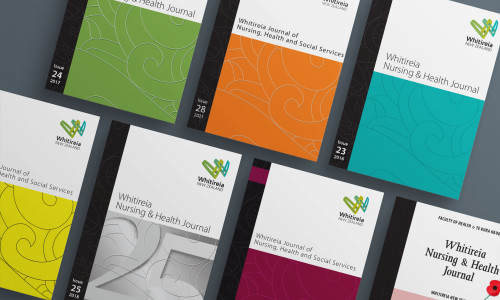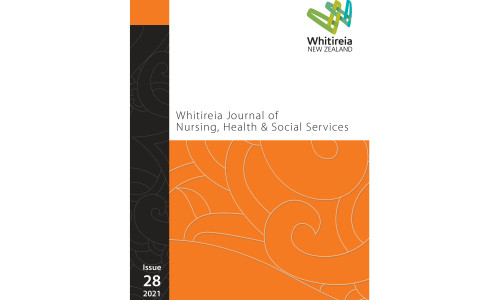The 31st volume of the Whitireia Journal of Nursing, Health and Social Services will be available for free online from 28 October 2024. Since its inception over 30 years ago, students, staff and industry professionals have submitted research to be published in the annual journal, covering a range of different healthcare-related topics and celebrating the incredible academic contributions of the Whitireia and WelTec community. A beacon of inter-disciplinary collaboration, the journal is published with the students of the Whitireia Graduate Diploma in Publishing, who work with the journal’s editorial board and contributors to prepare it for publication, doing everything from editing and production to marketing.
This year’s articles engage with themes of inclusivity and accessibility. Our authors investigate many issues including compassion fatigue, cultural safety in practice, neurodivergence in vocational education and the role of physical health within the mental healthcare sector.
Also included is an editorial from Tania Mullane, Taulapapa Loma-Linda L. Tasi, Teramira Schütz and Loha Isaako-Toloa, ‘The Place of Tangata Moana: The Whitireia Experience’, which highlights the importance of tangata moana in Aotearoa New Zealand, and how the Whitireia and WelTec Bachelor of Nursing Pacific is essential to supporting Pacific students’ experience and learning in the health system.
The articles are:
‘Third-Year Ākonga Reflections on the Bachelor of Counselling and Addiction Practice: Evaluating the Degree’
By Lee Smith & Steve Hogan
“Given the coexistence of mental health concerns and addiction, more dual-focus courses are needed. Exploring ākonga perceptions of these relatively new courses can inform the courses’ development.”
‘Compassion Fatigue: The Real Emergency Paramedics Face’
By Abishkar Palma & Kaaryn Cater
“Are paramedics looking after themselves, while they look after their patients?... Job satisfaction, education and frequent monitoring of practitioners’ mental health were identified as key protectors against compassion fatigue.”
Author Abishkar Palma says: “I have wanted to be a paramedic since I was a kid but was surprised to see the number of burnt-out and cynical providers I worked with. I did not want to end up like that so, when the opportunity came up to write about anything paramedic-related for uni, I chose this topic.”
‘How are Registered Nurses Supporting the Physical Health of Service Users with Serious Mental Illness’
By Carmel Haggerty, Ayla Chamberlain, Judith Hall, Vicky Jennings & Danielle Hann
“Each service user should be treated as a ‘whole person’, not just a diagnosis… A scoping literature review was undertaken to better understand how physical health issues are identified and managed in practice, and where current research places the role of Registered Nurses.”
When asked “What are the key things you hope people take away from your research?”, Carmel Haggerty, author and Head of the School of Health and Wellbeing, said “that the life expectancy of persons with Serious Mental Illness is less that the general population. That there are many medical side effects of the medication used to treat that need to be monitored carefully. Also, that people with Serious Mental Illness are more at risk of a variety of illnesses due to the lifestyle choices, therefore nurses need to provide education, routine assessment and screening, as well as encourage health care e.g. dental, vision, hearing regular checkups.”
‘What’s in a Name: Challenges Vocational Educators Face with Diagnostic Labels Associated with Neurodivergence’
By Tiffany J. Stenger, Dr Stephanie Kelly & Dr Rachel Tallon
“All learners have the right to receive equitable and appropriate education. However, academic literature reveals educator uncertainty about how to effectively cater for all neurodivergent learners... This paper aims to add to the discussion about the role both diagnoses and diagnostic labels can have in vocational education.”
‘Trans-Inclusive Paramedic Practice: Translating Cultural Safety into Everyday Transgender-Affirming Care’
By Rachel Fairweather, Noah J. Earnshaw & Amanda Bird
“Paramedics working with vulnerable populations have a moral responsibility to provide culturally safe and competent care. Specialised training and continuing clinical education are essential to providing comprehensive gender-affirming healthcare.”
‘Tiaki Moemoeā: The Dreamkeepers’ Role in Supporting Pacific Learner Aspirations’
By Yvonne Kainuku & Wendy Trimmer
“A critical element in closing the gaps in health disparities for Pacific people living in Aotearoa New Zealand is the presence of a culturally appropriate health workforce… The discussion will show how Tiaki Moemoeā can contribute to the transformational change in nursing education in Aotearoa.”
Author Yvonne Kainuku, says: “Tiaki Moemoeā: The Dreamkeepers role within the learning journey of Cook Island nursing students is a result from the findings of my master's thesis ‘No-one left behind’. The research project explored the lived experiences of Cook Islands peoples during their three-year nursing training within a Bachelor of Nursing Pacific (BNP) programme in Aotearoa NZ. The various features which define the theme Tiaki moemoeā (dreamkeeper) have the potential to contribute to transformational change in nursing education training in Aotearoa, New Zealand.”
The last eleven years of the journal is open access, which provides a wide range of readers with information about the health and social services professions and spotlights the authors’ scholarship. Readers can view and revisit the articles at any time.
To access the journal volumes from the last eleven years, click here.
Submissions for the 32nd volume will be open from 3 December 2024 to 3 February 2025. Find more information and submit your work for consideration here.

